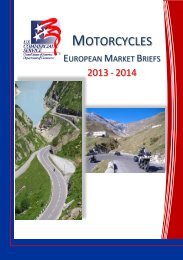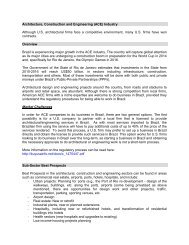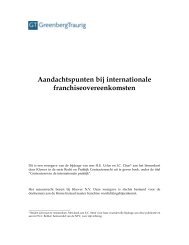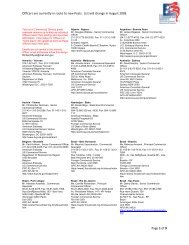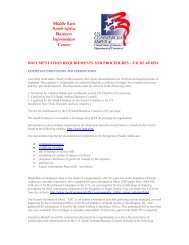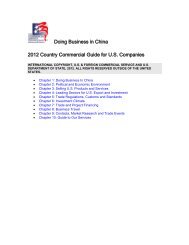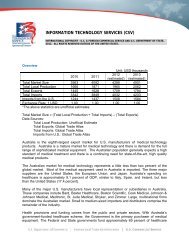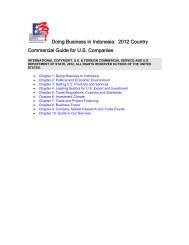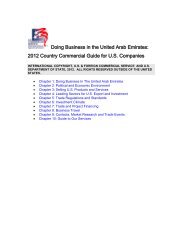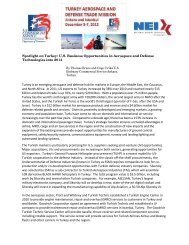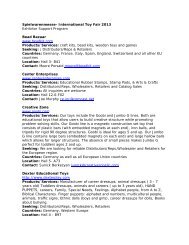2011 Bahrain Country Commercial Guide - US - Export.gov
2011 Bahrain Country Commercial Guide - US - Export.gov
2011 Bahrain Country Commercial Guide - US - Export.gov
Create successful ePaper yourself
Turn your PDF publications into a flip-book with our unique Google optimized e-Paper software.
financial crisis, coupled with the political unrest of <strong>2011</strong>, negatively impacted the growth<br />
in this sector.<br />
Competition from State Owned Enterprises Return to top<br />
Established in June 2006, the <strong>Bahrain</strong> Mumtalakat Holding Company manages all of the<br />
Government's state non-oil & gas enterprises. Mumtalakat holds minority and majority<br />
stakes in more than 35 commercial enterprises, representing a portfolio value of<br />
approximately <strong>US</strong>D 9.1 billion. Mumtalakat‘s portfolio of companies spans a variety of<br />
sectors, including aluminum production, financial services, telecommunications, real<br />
estate, tourism, transportation, and food production. These include:<br />
-Aluminum <strong>Bahrain</strong> (ALBA)<br />
-Arab Satellite Communications Organization (ARABSAT)<br />
-Arab Shipbuilding & Repair Yard (ASRY)<br />
-<strong>Bahrain</strong> Airport Company<br />
-<strong>Bahrain</strong> Food Holding Co.<br />
-<strong>Bahrain</strong> International Circuit<br />
-<strong>Bahrain</strong> Real Estate Company (Edamah)<br />
-<strong>Bahrain</strong> Telecommunications Company (BATELCO)<br />
-Gulf Air Company<br />
-Hawar Island Development Company<br />
-McLaren Group<br />
-National Bank of <strong>Bahrain</strong> (NBB)<br />
-Tourism Projects Company<br />
Political Violence Return to top<br />
Historically, <strong>Bahrain</strong> has been an open, politically moderate, economically liberal Gulf<br />
state that enjoys close ties to the United States. In recent years, <strong>Bahrain</strong> has seen<br />
periodic outbursts of political unrest arising from demands for political and social reform<br />
and on issues such as housing, employment, and sectarian discrimination.<br />
In February and March of <strong>2011</strong>, <strong>Bahrain</strong> witnessed unprecedented political and civil<br />
unrest that resulted in at least 35 deaths. All 18 opposition members of parliament<br />
resigned to protest the use of force against civilians. In March <strong>2011</strong>, the Government<br />
imposed emergency law (―State of National Safety‖), during which <strong>Bahrain</strong>i security<br />
forces conducted operations and during which military forces from Saudi Arabia and the<br />
United Arab Emirates were deployed to <strong>Bahrain</strong>. The Government lifted the State of<br />
National Safety on June 1, <strong>2011</strong>. Parliamentary by-elections were peacefully conducted<br />
in September <strong>2011</strong> to replace the vacated parliamentary seats. In July, the Government<br />
of <strong>Bahrain</strong> launched a National Dialogue process that resulted in several recommended<br />
reforms, though opposition groups generally rejected the process. In November <strong>2011</strong>,<br />
the royally-appointed <strong>Bahrain</strong> Independent Commission of Inquiry (BICI) released a<br />
detailed report on its findings and recommended reforms, particularly in the security<br />
services. As of March 2012, the Government of <strong>Bahrain</strong> has implemented some of the<br />
recommendations made by the BICI and National Dialogue, but political and civil unrest<br />
continues in some areas.<br />
Ongoing demonstrations have occasionally degenerated into violent clashes between<br />
police and protestors, but such violence is normally confined to specific neighborhoods,<br />
69




